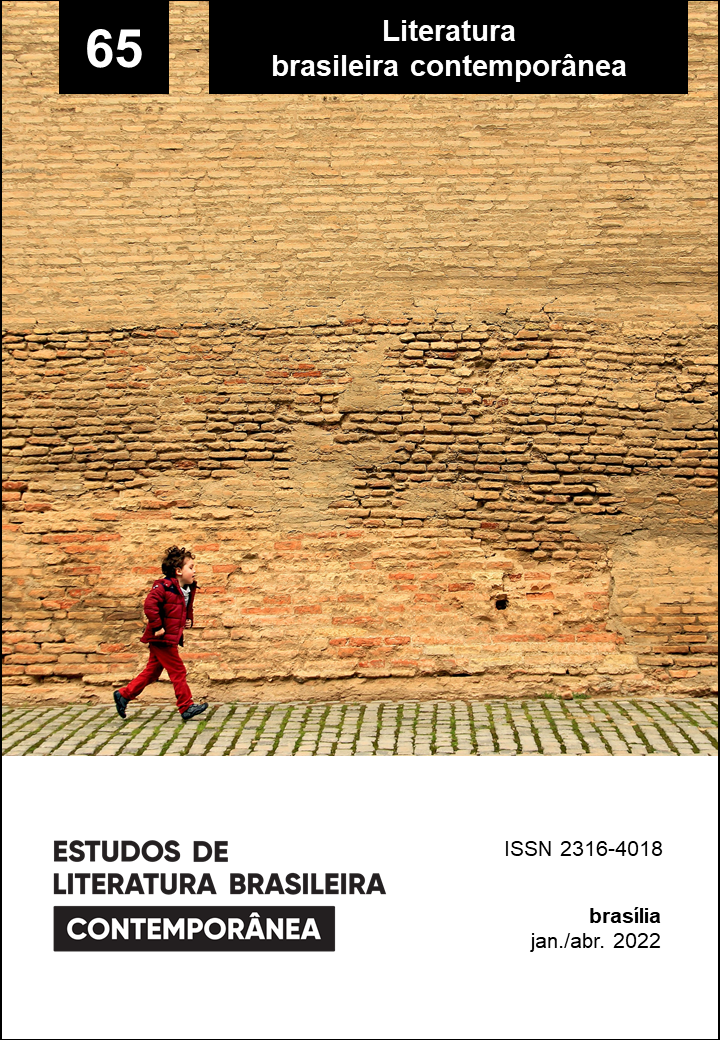À terceira margem do Atlântico: um sertão de silêncio e desejo em Desmedida, de Ruy Duarte de Carvalho
DOI:
https://doi.org/10.1590/2316-40186509Keywords:
Ruy Duarte de Carvalho, Guimarães Rosa, Euclides da Cunha, sertão, realAbstract
Taking Desmedida as a compass and the route of the Portuguese-Angolan Ruy Duarte de Carvalho as a route, this article discusses and problematizes the search for an origin and a meaning for the sertão in the Brazilian symbolic production. From the accounts of the first travelers who arrived in the country, through texts by researchers, historians, or writers, the sertão is described as an empty immensity to be explored and circumvented by words – a stage for multiple figurations, transgressions, and subversions of language. Desmedida works as a trigger of meaning and a guiding for the path undertaken in this work: one that points to the sertão as an excess of emptiness – or lack of measure, limit, and frontier – already in the structure of the signifiers selected to name it. When crossing the sertão of Euclides da Cunha and Guimarães Rosa, Ruy Duarte de Carvalho presents two different ways of dealing with the real of the sertão and with the impossibility of narrating it. The twisting of texts, times and existences undertaken by Carvalho is read as a turning point in the subjectivation modes of the subject and language and its effects on the concepts of fiction and representation in the arrival of modernity, as identified by the philosopher Jacques Rancière. To investigate the concepts of real and emptiness, articles by Raul Antelo and Jacques Lacan were used as theoretical references.
Downloads
References
ANDRADE, Vania Maria Baeta (Org.) (2016). Novo dicionário de migalhas da psicanálise literária. Belo Horizonte: Cas’a’screver.
ANTELO, Raúl (2001). A genealogia do vazio. In: ANTELO, Raúl. Transgressão e modernidade. Ponta Grossa: EdUEPG. p. 25-39.
BENJAMIN, Walter (1994). A crise do romance. In: BENJAMIN, Walter. Magia e técnica, arte e política: ensaios sobre literatura e história da cultura. São Paulo: Brasiliense. p. 54-60. (Obras escolhidas: v. 1).
BENJAMIN, Walter (2020). Alarme contra incêndio. In: BENJAMIN, Walter. Rua de mão única. infância berlinense: 1900. Belo Horizonte: Autêntica Editora. p. 42.
CARVALHO, Ruy Duarte de (2010). Desmedida: Luanda, São Paulo, São Francisco e volta. Rio de Janeiro: Língua Geral.
CAMINHA, Pero Vaz de (s.d.). Carta de Pero Vaz de Caminha. Disponível em: http://objdigital.bn.br/Acervo_Digital/Livros_eletronicos/carta.pdf. Acesso em: 1º dez. 2021.
CUNHA, Euclides (2001). Os sertões: campanha de Canudos. São Paulo: Ateliê Editorial.
GALVÃO, Walnice Nogueira (2001). O império do Belo Monte: vida e morte de Canudos. São Paulo: Fundação Perseu Abramo.
LACAN, Jacques (2003). Lituraterra. In: LACAN, Jacques. Outros escritos. Tradução de Vera Ribeiro. Rio de Janeiro: Zahar. p. 15-25.
LACAN, Jacques (2005). A angústia. Rio de Janeiro: Zahar.
LACAN, Jacques (2016). A terceira. In: LACAN, Jacques. Documentos para uma Escola VI – A terceira: uma escola para a psicanálise. Tradução de Analúcia Teixeira Ribeiro. Rio de Janeiro: 7Letras.
LIMA, Luiz Costa (2019). O mundo em perspectiva: Guimarães Rosa. In: ROSA, Guimarães João. Primeiras histórias. São Paulo: Global Editora. p. 161-176.
RANCIÈRE, Jacques (2009). O inconsciente estético. São Paulo: Editora 34.
RANCIÈRE, Jacques (2017). O fio perdido. São Paulo: Martins Fontes.
RANCIÈRE, Jacques (2021). As margens da ficção. São Paulo: Editora 34.
ROSA, Guimarães João (1965). Diálogo com Guimarães Rosa. [Entrevista a] Günter W. LORENZ. Templo Cultural Delfos. Disponível em: http://www.elfikurten.com.br/2011/01/dialogo-com-guimaraes-rosa-entrevista.html. Acesso em: 8 jun. 2022.
ROSA, Guimarães João (2019). Grande sertão: veredas. São Paulo: Companhia das Letras.
Downloads
Published
How to Cite
Issue
Section
License
Copyright (c) 2022 Cíntia Borges A. Fonseca

This work is licensed under a Creative Commons Attribution-NoDerivatives 4.0 International License.
Authors who publish in this journal agree to the following terms:
a) The authors maintain the copyright and grant the journal the right of first publication, the work being simultaneously licensed under the Creative Commons Attribution License-Non Commercial 4.0 which allows the sharing of the work with acknowledgment of the authorship of the work and publication this journal.
b) Authors are authorized to enter into additional contracts separately, for non-exclusive distribution of the version of the work published in this journal (eg publish in institutional repository or as a book chapter), with authorship recognition and publication in this journal.
c) Authors are allowed and encouraged to publish and distribute their work online (eg in institutional repositories or on their personal page) after the editorial process, as this can generate productive changes, as well as increase the impact and citation of published work (See The Effect of Free Access).
d) The authors of the approved works authorize the magazine to, after publication, transfer its content for reproduction in content crawlers, virtual libraries and the like.
e) The authors assume that the texts submitted to the publication are of their original creation, being fully responsible for their content in the event of possible opposition by third parties.


